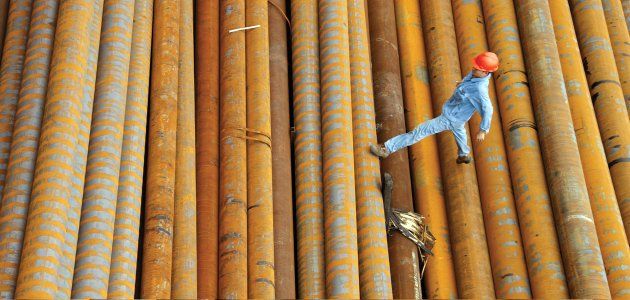
People say the government should be run more like a business. So imagine yourself as CEO. Your bridges are crumbling. Your air-traffic control system doesn't use GPS. The Society of Civil Engineers gave your infrastructure a D and estimated that you need to make more than $2 trillion in repairs and upgrades. Sorry, chief. No one said being CEO was easy.
But there's good news, too. Because of the recession, construction materials are cheap. So is labor. And your borrowing costs? They've never been lower. That means a dollar of investment today will go much further than it would have five years ago—or than it's likely to go five years from now. So what do you do? If you're thinking like a CEO, the answer is easy: you invest.
That's what the administration is proposing to do. But their plan is too modest. The $50 billion bump in infrastructure spending it outlined is only for surface transportation. And as for our water systems, schools, and levees? This is not a time for half measures. It's a rare opportunity to do what we need to do—and save money doing it.
In 2009, Congress passed the American Recovery and Reinvestment Act—the stimulus. Billions went to the Transportation Department to improve our roads, rails, and runways. That money was, in turn, given to the states, which drew up lists of what they needed to do and how much it would cost.
When the Feds checked in on the funds, what they found shocked them. The projects were coming in at about 20 percent less than estimated. The Transportation Department looked at the share that went to the Federal Aviation Administration for runway repairs. The money the FAA thought would complete 300 projects was going to finish 367. The stimulus, the Feds realized, had blundered into an incredible deal: the recession was driven by the collapse of the construction sector. People who built things were now out of work. The materials used for building things were now on fire sale. The companies that organized the building of things were suddenly desperate for jobs. As a result, building things was suddenly dirt cheap.
And it still is. Unemployment in the construction sector is at 17 percent—and that doesn't even count the construction workers who've given up looking for jobs. "There's work that needs to be done," Larry Summers, outgoing chairman of the National Economic Council, told me. "There are people there to do it. It seems a crime for the two not to be brought together."
As for debt, delaying a dollar of needed repairs is no different from racking up a dollar the government owes. "You run a deficit both when you borrow money and when you defer maintenance," Summers says. "Either way, you're imposing a cost on future generations." Plus, if America has to borrow money, now is the time. The interest rate on 10-year Treasuries is less than 3 percent—the lowest it has been since the 1950s. So a dollar of debt is cheap, and a dollar of infrastructure investment goes far.
We'll have to pay down that debt, of course. But part of paying down the debt is increasing economic growth. What worries the market is the size of our debt against the size of our GDP. If our economy grows faster than our debt, then our debt, in the eyes of the market, gets smaller. But if our economy is going to grow that fast, we'll need an infrastructure able to support that kind of growth. Tomorrow's energy contracts won't be won by the country with yesterday's energy grid.
The problem is that the process by which we choose infrastructure projects is embarrassing. About 10 percent of infrastructure spending comes from earmarks. Most of the rest depends on a formula in which the government just hands money to the states. There's no requirement for cost-benefit analysis. The decisions are horribly politicized. If taxpayers are making a huge investment in our nation's infrastructure, then we're owed an assurance that policymakers are choosing the best projects. That suggests a grand compromise in which more infrastructure money is tied to reforms ensuring a better process for spending that money.
There has never been a better moment for America to rebuild. An unlikely and unwelcome array of forces has converged to match our needs and the economy's bargains almost perfectly. The only question is if we'll run our government like a business, alert to good opportunities, or if we'll run it as we have been, squabbling among ourselves while things get worse.
How about it, chief?
Uncommon Knowledge
Newsweek is committed to challenging conventional wisdom and finding connections in the search for common ground.
Newsweek is committed to challenging conventional wisdom and finding connections in the search for common ground.
About the writer
To read how Newsweek uses AI as a newsroom tool, Click here.








